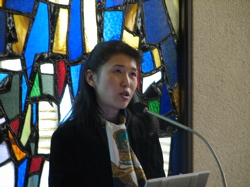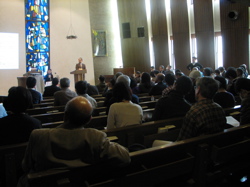Center for Interdisciplinary Study of Monotheistic Religions(CISMOR)Doshisha University
> Public Lectures > The Recent Situation of the Caucasus: Focusing on the Political Movements, the Ethnic Conflicts, the Religions, and the Impacts of the Georgian WarPublic Lectures
Public Lecture
The Recent Situation of the Caucasus: Focusing on the Political Movements, the Ethnic Conflicts, the Religions, and the Impacts of the Georgian War
| Date: |
2009/02/14 13:00-14:30 |
|---|---|
| Place: | Chapel in the Divinity Hall, Doshisha Univ. |
| Lecture: | Yoko Hirose (Assistant professor, Faculty of International Relations, University of Shizuoka) |
| Summary: | |
|
Due to its geopolitical location and the wealth of natural resources in the Caspian basin, the Caucasus has always held strategic importance for world powers. However, the existence of many different ethnic groups, religions, languages, and cultures, as well as lingering Russian influence, makes it difficult to stabilize and democratize this region. Especially, after the collapse of the Soviet Union, specific religions that had been prohibited during the Soviet reign resumed activities, and religious awareness grew, which resulted in the breakout of a number of conflicts other than border disputes. This lecture aimed to explore the prospect of the stabilization of the Caucasus region, upon the understanding of its complicated geopolitical situation. The recent confusion experienced by the Caucasus region, including the Georgian Conflict, should be categorized as an international political conflict over oil and other natural resources, as indicated by the unstable diplomatic policies of the countries in this region, which constantly swing among the U.S., Russia, and the EU. For example, many of the countries in the Caucasus region that became independent from Russia wanted to rid themselves of Russian influence and foster cooperative relationships with the U.S. and western/eastern Europe. As it turned out, however, such a situation induced competition between Russia and the U.S. for power in this region, and threw this region into a state of confusion. The results include the dual diplomacy in which Azerbaijan served as an intermediary between Russia and the Caucasus and the isoilation of Armenia,that had no choice but to rely on Russia. In addition, the EU, which was heavily interested in the Caucasus, attempted to foster military and economic ties with the countries in the region by working with them to join NATO and WTO, and this movement later became one of the causes of the Georgian Conflict. Under these circumstances, presidential elections were held in Azerbaijan, Armenia, Georgia, and Russia in 2008, and these countries were further torn between internal and diplomatic affairs under new administrations. The Georgian Conflict resulted from a complicated political situation, comprised of new policy courses presented by the new presidents of Russia and Georgia, continued energy development in this region, competition for the control over energy transportation routes, and pro-democracy movements. In this sense, the conflict was a typical incident that reflected the complex and diverse nature of the Caucasus region. The Georgian Conflict turned the Black Sea region into a venue of the competition for hegemony between Russia and NATO, and maximized the domestic confusion of Georgia. These situations, coupled with the worldwide financial crisis, seriously affected the economy of the Caucasus region. After the Georgian Conflict was over, many of the involved countries hoped for the stabilization of the Caucasus region, and Turkey and Iran, in addition to prospective partners, such as the U.S., Russia, and the EU, volunteered to act as an intermediary between the Caucasus and the rest of the world. In doing so, however, Turkey was supposed to work for the interest of the EU, while Iran aimed to increase its regional presence in the Caucasus and Central Asia under its anti-Western policy. Consequently, this situation further intensified and complicated competition for power. One of the few bright prospects is the connection between Georgia and Russia through Christianity, or the Orthodox Church. Patriarch Ilia of the Georgian Orthodox Church is in a good position to contact Russian leaders. Additionally, theological students of Russia and Ukraine studied at the Georgian Orthodox Church during the Soviet reign. With these difficult regional conditions, countries in the Caucasus region have to make greater effort to promote a balanced diplomacy and ensure survival. In concluding, the lecturer pointed to the role that the religious network mentioned above can assume for peace in Georgia and the rest of the Caucasus region after the Georgia Conflict. Kenichiro Takao (Graduate Student of School of Theology, Doshisha University) |
|
|
Handout |
|

